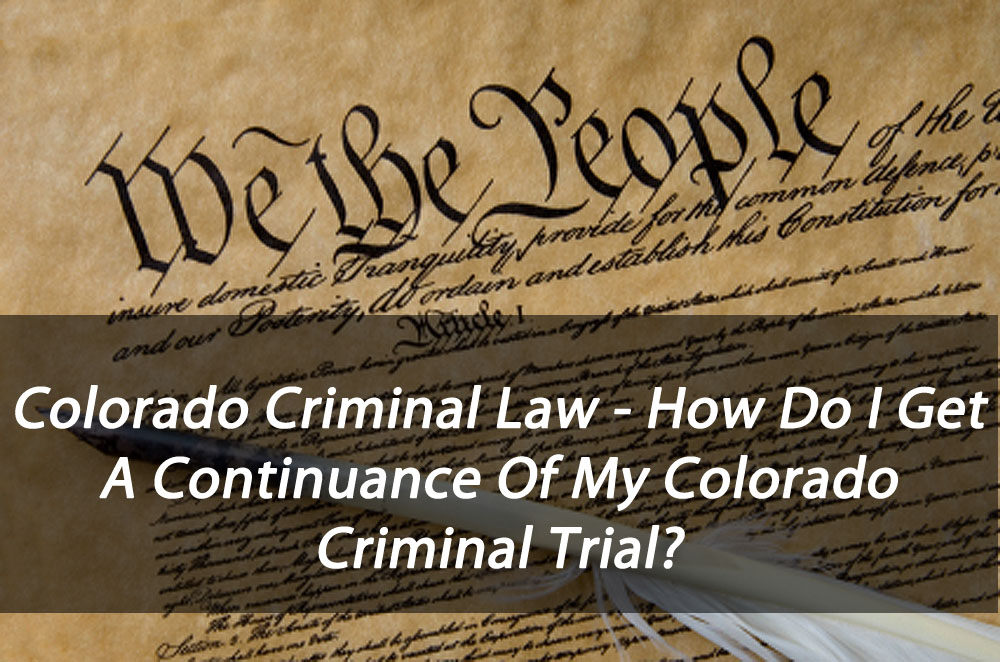






Colorado Criminal Law – How Do I Get A Continuance Of My Colorado Criminal Trial?
By H. Michael Steinberg – Colorado Criminal Defense Lawyer – Attorney
 Colorado Criminal Law – How Do I Get A Continuance Of My Colorado Criminal Trial? – Often when a Colorado criminal trial approaches Defendants lose faith in their present lawyer and desire to retain a new lawyer. This article addresses whether a trial judge will permit the change and the issues and rules of law that are applied when the judge makes the decision to grant – or to deny – the continuance of a criminal trial.
Colorado Criminal Law – How Do I Get A Continuance Of My Colorado Criminal Trial? – Often when a Colorado criminal trial approaches Defendants lose faith in their present lawyer and desire to retain a new lawyer. This article addresses whether a trial judge will permit the change and the issues and rules of law that are applied when the judge makes the decision to grant – or to deny – the continuance of a criminal trial.
In the case of People vs. Eric Lamont Brown – decided by the Colorado Supreme Court on April 7, 2014, the Court analyzed the issues and that analysis helps the reader understand the likelihood that a continuance of the Colorado criminal trial will be granted and a new lawyer allowed to substitute for the present lawyer whose services are being terminated.
A Colorado Defendant’s Constitutional Right To His Lawyer Of Choice
The Sixth Amendment to the United States Constitution provides the legal foundation for a criminal defendant the right to be represented by counsel of his or her choice. This is a right that has been well established for decades.
A Criminal Defendant’s right to select an attorney whom he or she trusts is considered to be central to the adversary system and “of substantial importance to the integrity of the judicial process” and therefore is this right is given “great deference” by the Courts.
BUT – the right to counsel of choice is not absolute. The Sixth Amendment “does not guarantee an absolute right to counsel of choice in all cases.”
There will be times when a Defendant’s interest in retaining a particular attorney, when weighed against “judicial efficiency” or “the public’s interest in maintaining the integrity of the judicial process,” must give way to these other public policy interests.
Understanding What Issues A Judge Must Consider Before Granting Or Denying A Continuance Of A Criminal Trial For The Reasons Of Changing Lawyers
In making the decision to grant or deny a Defendant’s request to retain a new lawyer who then asks for a continuance of a criminal trial – the Trial Judge is required to balance between a Defendant’s Sixth Amendment constitutional right to his or her counsel of choice and the public’s interest in the fairness and efficiency of the judicial system
The decision whether to grant a continuance of a trial for new counsel is a fact-based question decided by the Trial Judge by applying a series of “tests” or “factors” to the totality of the circumstances in the individual case.
This “multi-factor balancing test” – once again – is intended to help a Trial Court Judge weigh the public’s interest in the efficiency and integrity of the judicial system against the defendant’s Sixth Amendment right to counsel of choice.
No easy feat.
The Courts have said that there are no “mechanical tests” for determining whether a Trial Court abuses its discretion by denying a continuance. The analysis has become unnecessarily complex because the factors and tests applied to the decision have multiplied and multiplied again in number over time.
A Trial Judge’s Decision Granting Or Denying A Motion To Continue A Criminal Trial For The Substitution Of A New Lawyer Will Most Like NOT Be Overturned If Appealed
Like most evidence based motions at the trial level – a motion for a continuance falls within what is called “the sound discretion” of the Trial Court and this decision is almost never reversed as it is reviewed using the “abuse of discretion”standard. Under this standard a Trial Judge’s decision will almost be final unless the Trial Court’s decision was “arbitrary or unreasonable and materially prejudiced the defendant.”
I call this the one big bite of the apple test.
Absent an abuse of discretion that results in injustice, the decision to grant a continuance is left to the sound discretion of the trial court and will therefore most likely be FINAL.
Before the Brown case was decided by the Colorado Supreme Court – the Colorado Court of Appeals found that there were only FOUR considerations:
1. whether the defendant has an improper motive such as delaying trial;
2. whether the defendant’s chosen counsel available to take and try the case;
3. whether granting a continuance impacts the court’s docket; and
4. whether granting the continuance prejudices the prosecution beyond simply causing an inconvenience.
In Brown – the Colorado Supreme Court provided additional guidance to the Trial Judge in conducting the required balancing test under the Sixth Amendment’s right to counsel of choice decision it the Court’s analysis – adding several new factors to the above FOUR factors leading to the following more complete list of 11 factors – as follows:
1. the defendant’s actions surrounding the request and apparent motive for making the request;
2. the availability of chosen counsel;
3. the length of continuance necessary to accommodate chosen counsel;
4. the potential prejudice of a delay to the prosecution beyond mere inconvenience;
5. the inconvenience to witnesses;
6. the age of the case, buy tramadol overnight online both in the judicial system and from the date of the offense;
7. the number of continuances already granted in the case;
8. the timing of the request to continue;
9. the impact of the continuance on the court’s docket;
10. the victim’s position, if the victims’ rights act applies; and
11. any other case-specific factors necessitating or weighing against further delay.
Court’s are required to apply this multi-factor test AND no single factor is dispositive:
“…..and the weight accorded to each factor will vary depending on the specific facts at issue in the case.”
A Trial Judge is required to make a record of the impact of the above factors:
“….so that reviewing courts can determine if the trial court properly exercised its discretion in determining whether to grant a continuance:
If the Trial Court’s “findings” are on the record, the Colorado Courts of Appeal will respect the lower Court’s findings of fact if they are supported by evidence in the record.
Summary And Conclusion – Colorado Criminal Law – How Do I Get A Continuance Of My Colorado Criminal Trial?
A Trial Judge’s discretionary decision to grant or to deny a Defendant’s request to postpone a trial is reviewed under a Defendant’s Sixth Amendment constitutional right to counsel of choice.
A Defendant’s Sixth Amendment right to be represented by counsel of choice is “entitled to great deference.”
And while there is no “mechanical tests” for determining whether the denial of a continuance constitutes an abuse of discretion,” Colorado courts are now instructed, after the Brown decision, will now not only depend on the totality of the circumstances, but that decision must apply the 11 Brown factors:
1. the defendant’s actions surrounding the request and apparent motive for making the request;
2. the availability of chosen counsel;
3. the length of continuance necessary to accommodate chosen counsel;
4. the potential prejudice of a delay to the prosecution beyond mere inconvenience;
5. the inconvenience to witnesses;
6. the age of the case, both in the judicial system and from the date of the offense;
7. the number of continuances already granted in the case;
8. the timing of the request to continue;
9. the impact of the continuance on the court’s docket;
10. the victim’s position, if the victims’ rights act applies; and
11. any other case-specific factors necessitating or weighing against further delay which necessarily will vary in any given case.
Some Important Legal Considerations….
- The freedom of a defendant to choose his own counsel is central to our adversarial judicial system.
- A criminal defendant’s right to retained counsel of choice is protected by the Sixth Amendment.
- There is a presumption in favor of a Defendant’s choice of retained counsel but that presumption in favor of a defendant’s right to his retained counsel of choice may be overcome by considerations that “relate to the paramount necessity of preserving confidence in the integrity of the administration of justice.”
Colorado Criminal Law – How Do I Get A Continuance Of My Colorado Criminal Trial?
If you found any of the information I have provided on this web page article helpful please click my Plus+1 or the Share buttons for Twitter and Facebook below so that others may also find it.
If, after reading this article, you have questions about your case and would like to consider retaining our law firm, we invite you to contact us at the Steinberg Colorado Criminal Defense Law Firm – 303-627-7777.
Never stop fighting – never stop believing in yourself and your right to due process of law. You will not be alone in court, H. Michael at your side every step of the way – advocating for justice and the best possible result in your case.
 ABOUT THE AUTHOR: H. Michael Steinberg – Email The Author at [email protected] – A Denver Colorado Criminal Defense Lawyer – or call his office at 303-627-7777 during business hours – or call his cell if you cannot wait and need his immediate assistance – 720-220-2277. Attorney H. Michael Steinberg is passionate about criminal defense. His extensive knowledge and experience of Colorado Criminal Law gives him the edge you need to properly handle your case.
ABOUT THE AUTHOR: H. Michael Steinberg – Email The Author at [email protected] – A Denver Colorado Criminal Defense Lawyer – or call his office at 303-627-7777 during business hours – or call his cell if you cannot wait and need his immediate assistance – 720-220-2277. Attorney H. Michael Steinberg is passionate about criminal defense. His extensive knowledge and experience of Colorado Criminal Law gives him the edge you need to properly handle your case.
“A good criminal defense lawyer is someone who devotes themselves to their client’s case from beginning to end, always realizing that this case is the most important thing in that client’s life.”
You should be careful to make a responsible choice in selecting a Colorado Criminal Defense Lawyer – and we encourage you to “vet” our firm. Over the last 40 plus years – by focusing ONLY on Colorado criminal law – H. Michael has had the necessary time to commit to the task of constantly updating himself on nearly every area of criminal law, to include Colorado criminal law and procedure and trial and courtroom practice. H. Michael works hard to get his clients the best possible results in and out of the courtroom. He has written, and continues to write, extensively on Colorado criminal law and he hopes this article helps you in some small way – Colorado Criminal Law – How Do I Get A Continuance Of My Colorado Criminal Trial?

Other Articles of Interest:
- The Issue Of Speedy Trial Rights In Colorado
- Colorado Criminal Law – The Rules of Discovery in Colorado – Getting The Information You Need To Defend Your Clients
- Bail Bonds in Colorado
- Indeterminate Sentence for Sex Offenders (18-1.3-1004) 2012 Revision
- What A Colorado Criminal Defense Attorney Does – Part I – Pre-Trial






















